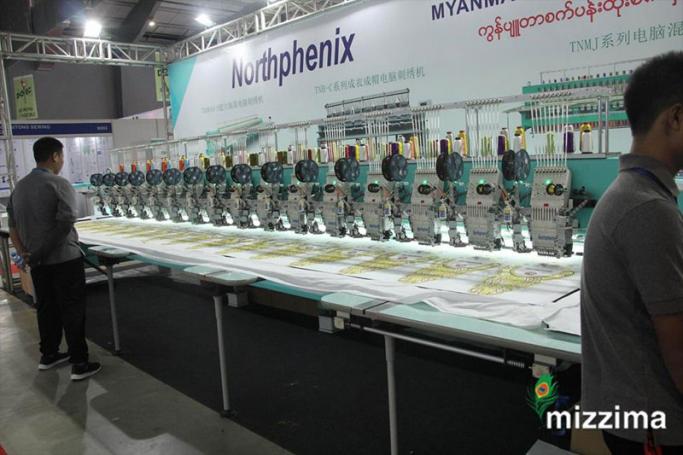With more than 130 brands from 13 countries’ showcases, the 7th Myanmar International Textile & Garment Industry Exhibition (MTG) took place at the Yangon Convention Center this week, highlighting the vibrant textile and garment industry in Myanmar and an unexpected spin-off from the US-China trade war.
Benefited from Everything But Arms (EBA) arrangements as part of the Generalised Scheme of Preferences (GSP) of EU, preferential exports to the EU have risen sharply in recent years, especially for the textile industry, as 72.2% of Myanmar’s exports are textiles, according to EU.
The exhibition was held on 6 December in Yangon.
Both domestic firms and foreign companies have benefited from the current economic environment in Myanmar.
After attending MTG for three times, Wu Chaolin, an agent for multiple machinery companies, observed the change in the local textile industry.
He said local industries are in small scales in general, but after gaining money from the foreign investment, some domestic factories are willing to renew its facilities as he provided and also expand the scales of its factory. According to the new companies law, overseas are allowed to hold up to 35% of shares in a domestic firm.
Hu, a Chinese backpack manufacturer, visited the MTG aiming to find potential machines for his new factory with a thousand workers in a suburb area of Yangon, set to start production in three months.
“I can avoid the high tariffs to export goods to the United States,” Wu said, explaining his reason for building a new factory in Myanmar.
As the US-China trade war escalated in recent months, many Chinese businessman including Wu are transferring their new factories from China to Myanmar to avoid the 20% tariffs on exports and also to benefit from the GSP policy from both U.S. and EU. “As well as the cheap labour in Myanmar,” Wu added.
Foreign policies has brought important benefits to the economy of Myanmar. “More than four hundred garment factories earn at least $2.2 billion from the foreign market a year,” said the organiser of MTG.
However, the human rights problems in Myanmar have cast a pall over the economy in Myanmar.
Experts from the European Commission and the European External Action Service express their concerns regarding human rights violations in Rakhine, Kachin and Shan states.
“If they do not act, Myanmar authorities are putting their country’s tariff-free access to the EU market in danger,” Cecilia Malmström, the EU Commissioner for Trade, said in EU Press release on 31 October.












